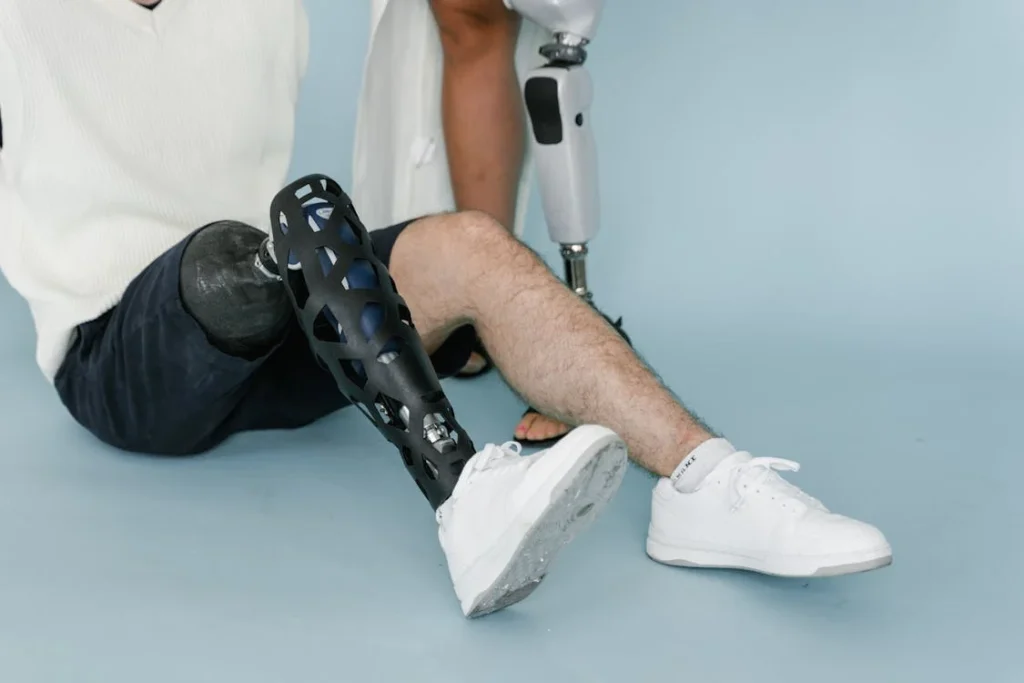When a child is born without a limb or loses one early in life, it can be tough—not just for the child, but for the entire family. There are many questions, many emotions, and often, a lot of confusion about what to do next. One of the most common concerns parents have is: “What are the best prosthetic options for my child?”
Choosing a prosthetic is not just about replacing a missing limb. It’s about helping the child grow with confidence, stay active, and feel included with their peers. Every age—from infancy to school years—comes with different needs. That’s why it’s so important to choose the right solution at the right time.
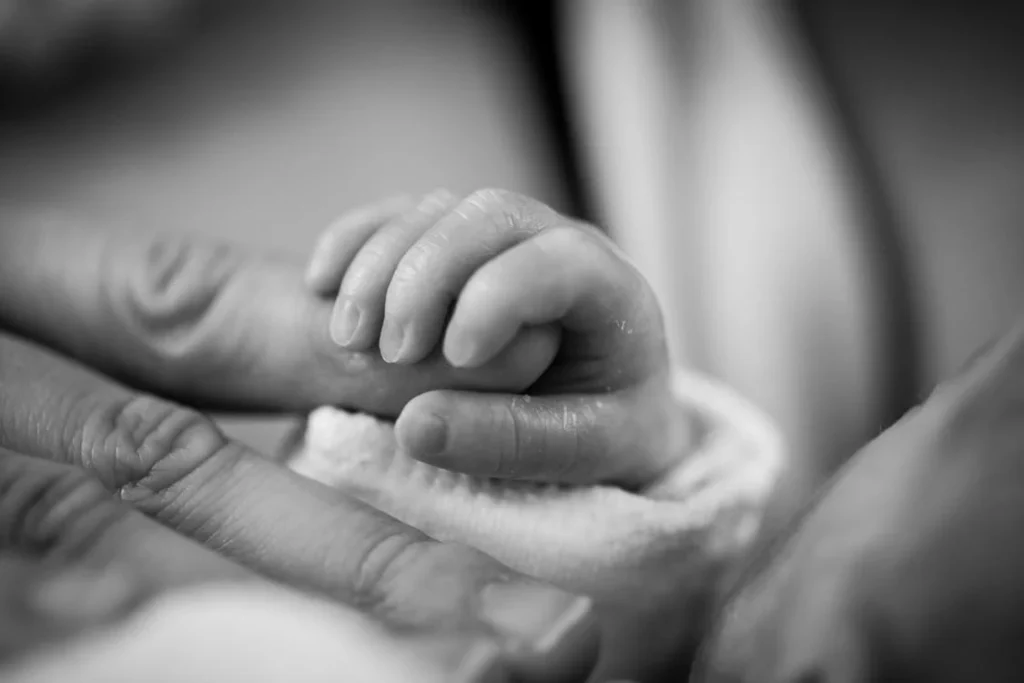
Prosthetic Options for Infants: Supporting Growth from the Very Beginning
Understanding the Needs of Infants with Limb Differences
Infants grow quickly in their first year, both physically and emotionally. When a child is born without a limb or loses one early in life due to trauma or illness, it can feel overwhelming for parents.
But the good news is, prosthetics for infants are designed to support this rapid stage of growth, help with early motor skills, and gently introduce the idea of using a limb.
At this stage, prosthetics aren’t about function the way they are for older kids. Instead, they play a key role in shaping body balance, posture, and muscle development. They also help babies explore the world around them more freely.
For example, a soft passive prosthetic arm allows a baby to learn crawling with more symmetry, helping both sides of the body stay equally active.
In most cases, prosthetic fittings begin between 6 and 9 months of age. This is when babies start sitting up and reaching out for things. A lightweight prosthetic gives them the chance to use both arms while playing, improving balance and confidence.
It also gets them used to the feel and idea of having a limb, which is important for long-term adaptation.
What Type of Prosthetic is Right for an Infant?
Prosthetics for infants are usually passive. This means they don’t have moving parts or sensors. Instead, they are custom-fitted soft limbs that match the size and shape of the missing arm or leg.
These prosthetics are made to be gentle, lightweight, and non-restrictive. They are not meant for fine motor control at this age but serve more as training tools to prepare for more functional devices later on.
Materials matter a lot here. At Robobionics, we use safe, skin-friendly, and ultra-light materials that don’t irritate or weigh the baby down. Each prosthetic is carefully shaped to avoid any discomfort.
Since babies grow quickly, these devices are usually updated every few months based on growth spurts.
Parents often worry that their baby won’t accept the prosthetic. But children at this age are very adaptable.
With a little encouragement and support from parents and caregivers, most babies accept and even enjoy the added ability to reach, push, and explore with both sides of their body.
If you’re unsure whether a prosthetic is needed so early, we always recommend starting with a professional evaluation.
Supporting Movement and Development through Therapy
Just giving a prosthetic is not enough. It’s equally important to encourage your baby to use it through fun activities and therapy.
Movement builds memory, strength, and comfort. That’s why early physical therapy plays a huge role.
We recommend working closely with a pediatric therapist who can guide you on exercises that help your baby become familiar with their new limb.
Things as simple as stacking blocks, crawling, or reaching for toys can turn into powerful learning moments. Repetition is key, but so is enjoyment. Babies learn best through play.
Robobionics supports parents through home-based gamified rehabilitation programs, even for infants. These playful exercises are tailored to your baby’s stage and can be done right at home.
They help your child become more confident with their movements while keeping things light and enjoyable.
Emotional Support for Parents and Caregivers
It’s natural for parents to feel anxious during this time. Seeing your baby fitted for a prosthetic can be emotional.
You may worry about how they’ll adjust, what their future will look like, and whether you’re doing the right thing. That’s okay. You’re not alone.
At Robobionics, we believe that supporting the family is just as important as supporting the child. Our care team offers guidance, check-ins, and emotional support throughout your journey.
We connect you with trained professionals who can help you navigate both the technical and emotional parts of this experience.
We also encourage connecting with other parents who’ve been through similar situations. Shared stories can bring a lot of comfort and confidence.
It’s often reassuring to see older kids who’ve grown up with prosthetics running, playing, and doing everything other kids do.
Choosing the Right Partner for Your Child’s Needs
Selecting the right prosthetics provider makes all the difference. It’s not just about getting a device.
It’s about building a partnership that supports your child’s growth, development, and comfort for years to come.
Robobionics works hand-in-hand with Omnify Prosthetics, our authorized clinic network, to deliver care that is personal, quick, and reliable.
We follow a step-by-step approach—from evaluation to demo to trial—so you always know what’s happening and why. We make sure every detail is designed around your child’s comfort and well-being.
Because our prosthetics are made in India, service is faster, cost is lower, and help is always nearby.
We also provide local repair and maintenance, so your child never has to wait for weeks in case of damage or adjustment.

Prosthetic Options for Toddlers: Encouraging Confidence Through Play and Movement
Why Toddlers Need a Different Approach
By the time your child reaches toddlerhood—around ages 1 to 3—they’re no longer just exploring the world with their eyes and hands. They’re now walking, climbing, grabbing things, and constantly on the move.
For toddlers with limb differences, this stage becomes especially important. A prosthetic at this age is no longer just for posture or balance—it becomes a key part of their everyday activity.
Toddlers are curious and fast learners. This is the time when they develop habits, build coordination, and become more independent. That’s why prosthetics at this stage need to support not just comfort and growth, but also action.
The right prosthetic will help your child do simple things like pick up toys, use crayons, hold cups, or balance while walking.
At Robobionics, we focus on giving toddlers prosthetic solutions that are easy to wear, safe for rough play, and most importantly, fun to use.
We want every toddler to feel that their prosthetic is not something they have to use—but something they want to use because it helps them do more.
Active Prosthetics for Growing Movers
Toddlers benefit most from active prosthetics. These are devices that allow some form of movement—such as grasping or pushing—without needing complex electronics.
While some toddlers may still use passive limbs depending on their needs, active devices help encourage use of the affected limb in daily routines.
One great option we recommend is a mechanical hand with a simple grip. It doesn’t require batteries or motors but uses body movement (like shoulder or elbow motion) to open and close.
These grips are great for toddlers who are learning to hold soft toys, small objects, or feed themselves. They offer more control than passive arms, but are still light and safe for daily play.
We also design customized sockets that are gentle on the skin and adapt easily to your child’s growth. Since toddlers outgrow their shoes and clothes quickly, their prosthetics also need regular updates.
At Robobionics, we make sure to review fitment every few months so that nothing feels tight, loose, or uncomfortable. This reduces irritation and increases usage time.
Making the Prosthetic Part of Their Daily Routine
Routine is everything for toddlers. From mealtimes to nap times, structure helps them feel safe. The same is true for prosthetic use.
Getting your child used to wearing their prosthetic every day—even for short periods—can go a long way in building confidence and skill.
Start by including the prosthetic in playtime. Let them wear it when they’re doing something they enjoy—like stacking blocks, throwing a ball, or drawing. This keeps the experience positive.
Never force it, but do encourage short, fun periods of use. You’ll be surprised how quickly toddlers adapt when they see their prosthetic helping them achieve something.
We also suggest giving the prosthetic a friendly name or decorating it with their favorite stickers. Personal touches can make it feel like a special tool rather than a medical device.
At Robobionics, we often work with families to customize the appearance of each prosthetic, helping the child feel proud and excited to use it.
The Role of Gamified Home-Based Therapy
Toddlers love games. So what better way to help them adapt to their prosthetic than through play-based therapy? At Robobionics, we’ve designed home-based rehabilitation exercises that turn learning into a game.
These are simple, screen-free activities that boost hand-eye coordination, balance, and limb awareness in a playful, pressure-free way.
Therapy at this age doesn’t need to be complicated. It can be as simple as building towers, playing with clay, or pouring water between cups.
Our rehab experts provide activity guides tailored to your toddler’s development stage and the type of prosthetic they’re using. We help you create a playful environment that supports healthy movement and confidence.
You don’t need to be a therapist to help your child succeed. You just need the right tools and support system. We’re here to offer both.
Preparing for Preschool and Beyond
As your toddler nears the age of three, they’re getting ready for preschool. This transition brings new challenges—and new opportunities. Your child may now interact more with peers, teachers, and social situations.
A prosthetic that supports these activities can help them feel more independent and included.
For example, being able to hold a spoon at lunchtime, carry their art supplies, or join in games during playtime makes a big difference. These small achievements boost their self-esteem and help others see your child as just another active kid.
Robobionics works closely with families to ensure preschool-age prosthetics are both functional and adaptable.
We also offer support for teachers and schools, helping them understand how to make the environment inclusive and encouraging for children with limb differences.
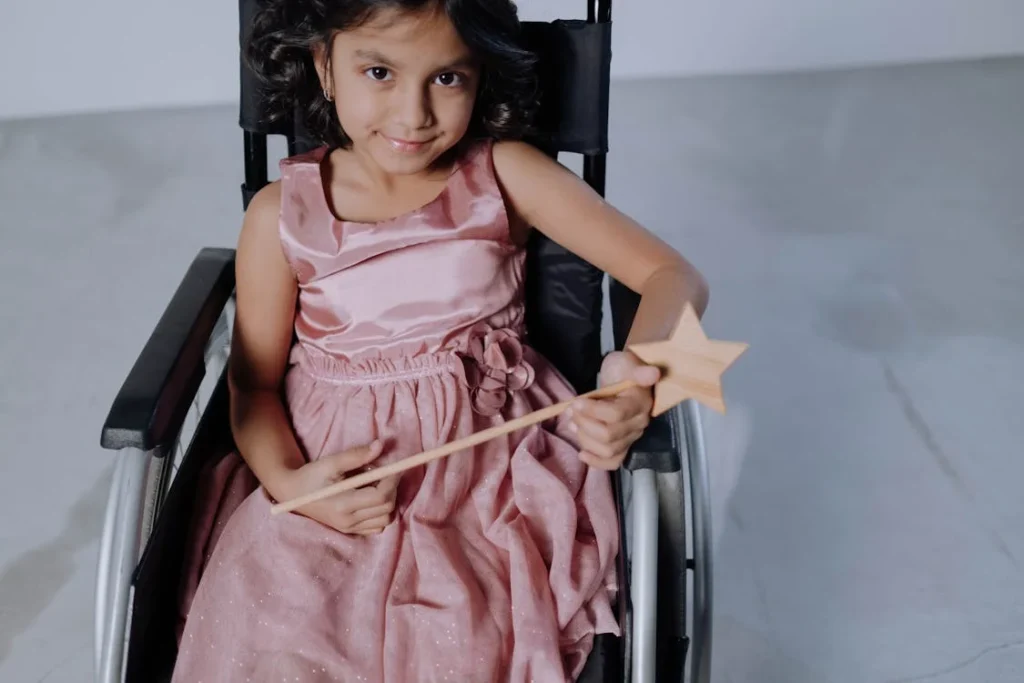
Prosthetic Options for School-Age Kids: Building Independence and Self-Esteem
Why This Stage Is So Important
Once your child reaches school age—typically around 5 to 12 years old—their world expands quickly. They’re now spending more time outside the home, learning new skills, and forming friendships.
This is a stage where confidence, independence, and identity start to take shape. For kids with limb differences, having the right prosthetic can make a huge difference in how they see themselves and how they interact with the world around them.
At this age, children want to do everything their peers are doing. That might be writing neatly in school, riding a bicycle, helping at home, or playing sports. They’re more aware of their bodies, their abilities, and how others see them.
That’s why prosthetics at this stage must be functional, easy to use, and comfortable for long hours of wear. More than anything, they should support the child’s growing need to be seen and treated just like everyone else.
At Robobionics, we design school-age prosthetics with these exact goals in mind. Whether your child needs a bionic hand to grip a pencil, or a below-knee prosthesis for running and jumping—we make sure it fits their lifestyle, their pace, and their personality.
Advanced Prosthetics for Active Learners
This is the age where advanced prosthetic solutions become truly meaningful. Many children are now ready for functional hands or legs that offer real control and flexibility.
For upper-limb differences, a myoelectric or bionic hand can be a game changer. These prosthetics respond to muscle signals and allow the child to open, close, or move the fingers with intention.
Grippy™, our flagship bionic hand, is a popular choice for school-age children. It’s lightweight, 3D-printed, and designed to look and feel natural.
With Grippy™, kids can hold objects, type, draw, and do many day-to-day tasks independently. The hand also has sensors that respond to simple muscle signals, helping kids control it with ease.
Lower-limb prosthetics for active kids are made for all-day comfort and balance. These devices are designed for walking, running, and playing without strain.
We focus on giving kids smooth mobility while ensuring the fit is snug, secure, and gentle on the skin.
At Robobionics, we also offer adjustable sockets and modular components. As your child grows, their prosthetic grows with them.
This makes it easier for parents to manage replacements and updates without starting from scratch every time.
Supporting Academics and Everyday Tasks
In school, your child needs to do more than just move around. They’re writing, using computers, carrying school bags, and doing classwork that requires fine hand movements.
That’s why prosthetics for this age need to support function without causing fatigue.
A well-fitted bionic hand can help with holding pencils, gripping books, using lunch boxes, and joining in classroom tasks without extra help.
For children who prefer non-electronic options, we offer mechanical devices that work using simple body movements and still allow a high level of function.
We also help with training programs that teach kids how to use their prosthetic efficiently in daily routines. This includes lessons on how to switch grips, pick up different objects, and practice activities at home or school.
We work closely with both families and teachers to make sure everyone is on the same page.
Building Social Confidence Through Personalization
Children at this age want to fit in. They’re more sensitive about how they look and how others see them.
That’s why personalization plays a huge role in prosthetic acceptance. When a child feels that their prosthetic reflects who they are, they’re more likely to use it confidently.
Robobionics offers a wide range of personalization options—from bold colors and superhero themes to soft, skin-toned finishes. We let kids and parents decide how they want their prosthetic to look.
Some children love bright, attention-grabbing designs. Others prefer a natural, seamless look. The choice is always theirs.
When kids feel proud of their prosthetic, they’re more open to showing it off, explaining how it works, and helping their peers understand it. This builds empathy in the classroom and helps remove any feelings of awkwardness or difference.
Therapy and Training That Keeps It Fun
Even though kids at this stage are more capable, they still need support in learning how to use their prosthetic efficiently. But training doesn’t have to be boring.
At Robobionics, our gamified rehab programs for school-age children turn therapy into engaging, challenge-based activities. These programs can be done at home and are created to match the child’s age, device type, and learning style.
We use creative exercises like obstacle challenges, drawing games, and movement-based tasks that feel more like play than therapy. Kids are naturally competitive, so we include small achievements, rewards, and progress tracking to keep them motivated.
Our programs also help improve focus, hand coordination, muscle strength, and control—all while boosting confidence.
Parents get easy-to-follow guides, and our support team checks in regularly to answer questions or adjust the training plan
Long-Term Benefits of the Right Prosthetic
Choosing the right prosthetic at this age is about more than just function. It’s about helping your child build the mindset that they are capable, complete, and in control of their life.
A well-fitting prosthetic can open doors to sports, hobbies, leadership, and creativity. It can help your child focus less on what’s missing and more on what’s possible.
Robobionics is committed to walking this journey with you. From the first fitting to the final adjustment, we’re here with local support, on-call service, and a nationwide network of clinics like Omnify Prosthetics that understand pediatric care deeply.
We’re proud to be part of India’s Make in India movement, offering solutions that are world-class, affordable, and always accessible.
Because every child deserves a future where their only limit is their imagination.
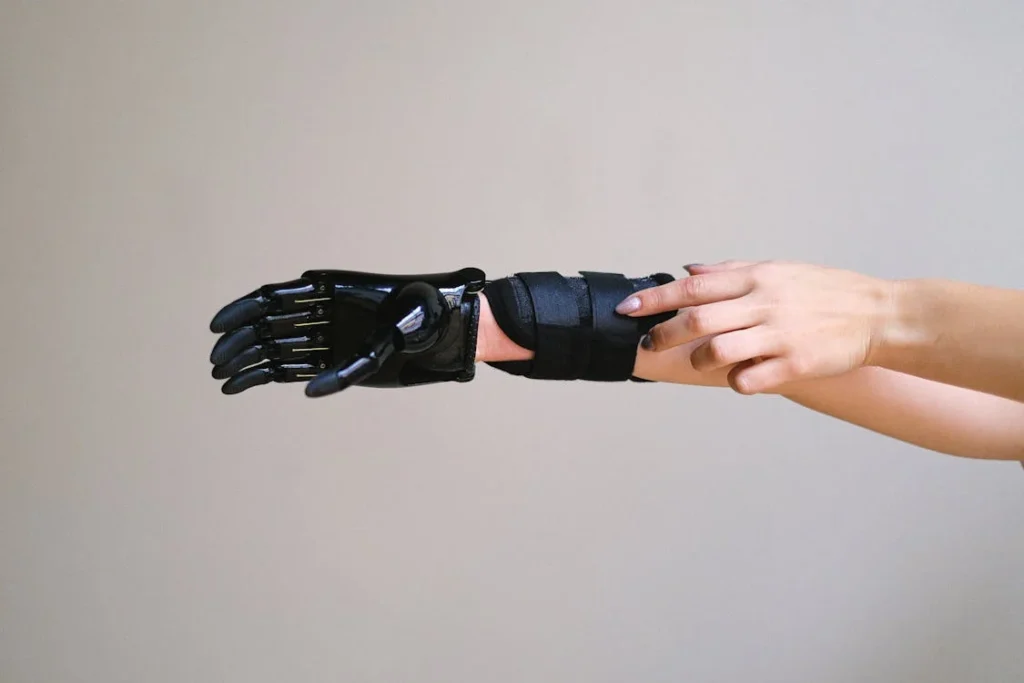
Managing Growth Transitions: When and How to Upgrade Your Child’s Prosthetic
Growth Doesn’t Wait—And Neither Should the Prosthetic
Children grow fast—sometimes faster than we expect. In just a few months, a prosthetic that fit perfectly can start to feel tight, heavy, or even frustrating.
Whether your child is an infant, toddler, or school-aged, it’s important to recognize that prosthetics are not one-time solutions. They’re dynamic tools that should change as your child does.
One of the most common questions parents ask us is, “How do I know when my child needs a new prosthetic?” The truth is, every child is different.
Some may need updates every few months. Others may adapt well to the same device for a year or more. But there are clear signs to watch for that indicate it’s time for a change.
If your child avoids wearing their prosthetic, seems irritated, walks differently, or complains of tightness or discomfort—that’s your first clue.
You might also notice skin marks, redness, or reduced usage in daily activities. These are gentle signals from your child’s body telling you it’s time for a refit or upgrade.
The Importance of Regular Check-ins
At Robobionics, we always stress the importance of routine check-ins—not just for the device, but for the child’s overall experience. Even if the prosthetic still fits physically, your child’s emotional or functional needs might have changed.
Maybe they’re starting school and need a more active device. Maybe they’ve taken an interest in drawing or sports and need better grip control.
That’s why we recommend scheduling a full assessment every 6 to 12 months. Our team doesn’t just look at growth measurements. We assess activity levels, emotional comfort, movement range, and long-term goals.
Based on this, we guide you on whether it’s time for a new prosthetic or a simple adjustment.
We also track your child’s preferences and feedback over time. Some children prefer to switch between devices depending on the activity.
For example, using a passive arm for casual use and switching to a myoelectric hand for tasks that require finer control. Our approach is never one-size-fits-all.
The Role of Technology in Keeping Up with Change
Prosthetic technology has come a long way in helping children move through stages smoothly. At Robobionics, our modular design philosophy allows devices to be upgraded without changing everything from scratch.
That means if your child outgrows the socket, we don’t need to replace the entire limb—just that part.
We also design our components with flexibility in mind. Growth plates in lower-limb prosthetics and size-adjustable fittings in upper-limb devices help extend the lifespan of each device while keeping your child comfortable and active.
This not only reduces cost but also ensures that the transition feels natural.
With our in-house 3D printing technology, we can quickly redesign and deliver updated parts tailored to your child’s exact measurements.
There’s no need to ship parts abroad or wait for weeks. Everything is done locally, faster, and with more precision.
Emotional Support During Transitions
Growth transitions aren’t just physical—they’re emotional too. For a child, switching prosthetics can sometimes feel strange or even scary. They may worry about learning to use something new, or fear losing the comfort of the old device.
That’s why it’s important to prepare your child for every stage with patience and open conversation.
We always encourage families to involve children in the decision-making process. Let them choose colors, ask questions, and be part of the fittings. This gives them a sense of ownership and helps them feel excited about the upgrade instead of nervous.
Our team at Robobionics includes child psychologists and care coordinators who guide families through this emotional adjustment.
Whether it’s the first prosthetic or the fifth, our goal is to make sure your child feels supported, safe, and ready to move forward.
Planning Ahead for Smooth Transitions
One of the smartest things a parent can do is plan for the next stage before it becomes urgent. Instead of waiting for discomfort or a sudden growth spurt, it helps to stay one step ahead.
At Robobionics, we offer “growth mapping” for each child. This includes projected measurements, activity goals, and therapy milestones. It helps you anticipate changes and avoid delays in fitting or training.
We also work closely with schools and therapists so that upgrades can be timed during holidays or quieter periods, giving your child time to adjust.
From first consultation to final delivery, our process is designed to minimize stress and maximize your child’s confidence.
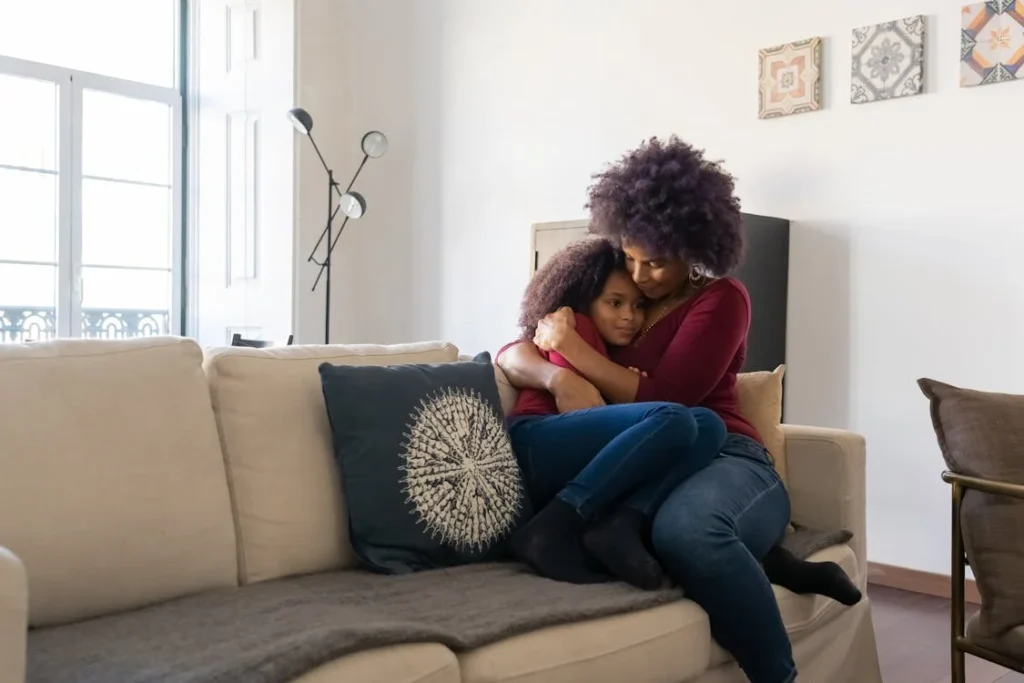
Empowering Parents and Caregivers: The Heart of the Prosthetic Journey
Why Parental Support Is More Than Just Help
When a child gets a prosthetic, it’s not just their journey—it becomes the family’s journey too. Especially for young children, a prosthetic isn’t something they learn to use all on their own.
It takes patience, encouragement, and day-to-day involvement from parents, caregivers, and extended family.
But support goes beyond helping the child put the prosthetic on or take it off. Parents often shape how the child views their limb difference and the role the prosthetic plays in their life.
Children pick up emotional cues from the adults around them. If they sense positivity, acceptance, and empowerment, they reflect those same feelings in their behavior and mindset.
If they sense worry, frustration, or fear, they may begin to associate their prosthetic with something negative or unwanted.
At Robobionics, we always tell families: your involvement matters as much as the prosthetic itself.
From the first fitting to daily use, your actions, tone, and attitude can transform how your child embraces this new part of their life.
Creating a Positive Environment at Home
Your home sets the stage for how your child experiences their prosthetic. The way you talk about the device, encourage its use, and respond to challenges can either build confidence or plant seeds of doubt.
That’s why we work closely with parents to create a nurturing, playful, and affirming environment at home.
One of the most effective strategies is to make the prosthetic part of normal life—not something that’s separate or special. Include it in your child’s daily routine just like you would brushing their teeth or tying their shoes.
Avoid overreacting to small frustrations. If the prosthetic slips off or feels tight one day, stay calm and troubleshoot together. This builds problem-solving skills and shows your child that setbacks are normal and fixable.
We also encourage using stories, games, and routines that reinforce body positivity. Read books featuring characters with prosthetics.
Celebrate small milestones like learning to hold a crayon or play a game with the device. Make it a moment of pride, not pressure.
How to Talk About the Prosthetic in Public
As children grow, they begin to notice how others react to their prosthetic. Whether it’s at school, the park, or a family gathering, social moments can be tricky. How you respond to questions or stares can have a big impact on your child’s comfort and confidence.
If someone asks about the prosthetic, a simple, confident answer helps normalize it. For example, “That’s his special hand—he uses it to do amazing things!”
Avoid apologizing, over-explaining, or rushing to change the subject. Children learn that it’s okay to talk about their limb difference when you do it naturally and positively.
We often suggest practicing these conversations ahead of time with your child. Give them a few age-appropriate responses they can use when someone asks about their prosthetic. This helps them feel prepared instead of caught off-guard.
At Robobionics, we offer workshops and one-on-one coaching for parents who want help navigating these social dynamics with grace and confidence.
Becoming an Advocate for Your Child
One of the most powerful things a parent can do is advocate for their child’s needs—especially in schools, clinics, and social settings.
Whether it’s asking for extra time during a classroom activity, ensuring a proper chair height, or requesting a school tour before your child starts a new term, these small efforts create big change.
We encourage parents to be active participants in meetings with teachers, therapists, and prosthetists. Your observations are valuable.
You see what your child struggles with at home, how they react to wearing the prosthetic, and what motivates them. Sharing this insight helps the entire care team make smarter decisions.
Robobionics provides every parent with a personalized support binder that includes progress trackers, device guides, and school communication templates.
We make it easy for you to stay organized and proactive as your child grows.
Supporting Emotional Growth Alongside Physical Growth
Emotional health is deeply connected to prosthetic use. Children with strong emotional support tend to be more open to trying new tasks, more resilient in the face of challenges, and more willing to wear and explore their prosthetic.
That’s why we encourage parents to talk openly about feelings, celebrate small wins, and be honest about hard days too.
If your child expresses frustration, let them know that it’s okay. But also remind them of how far they’ve come. Share stories of others who’ve gone through similar journeys. Show them what’s possible—not just what’s difficult.
At Robobionics, we believe emotional growth should be supported just as much as physical adaptation.
That’s why our family support services include emotional check-ins, storytelling tools, and access to peer networks where your child can meet others their age with prosthetics.
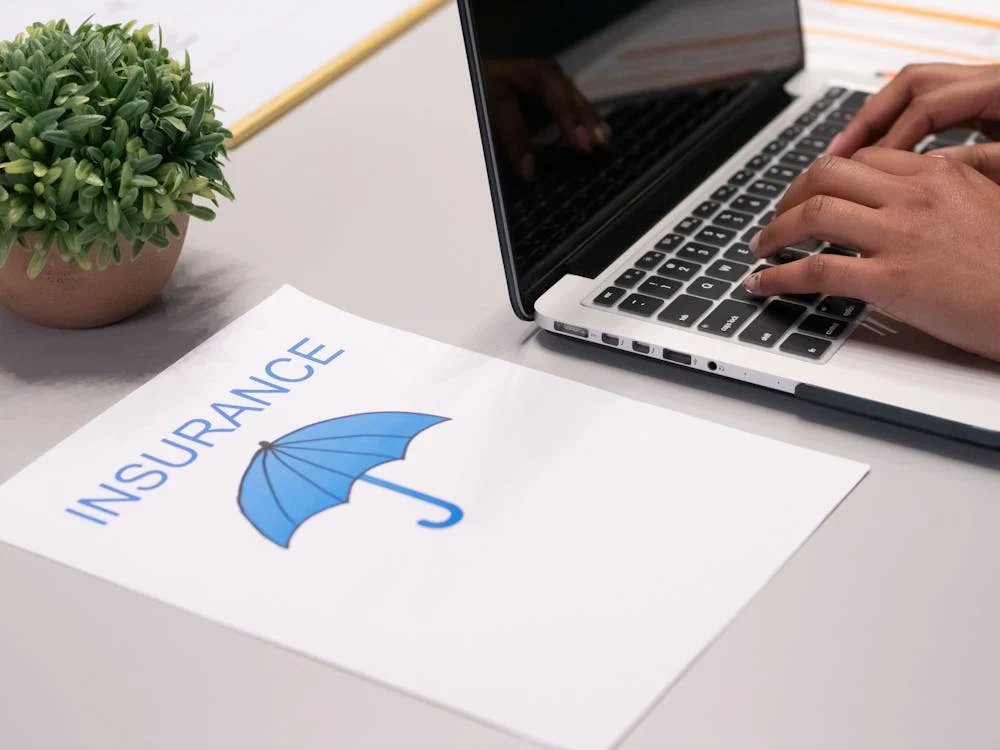
Accessibility and Affordability: Making Pediatric Prosthetics Reach Every Child in India
Why Access Still Remains a Challenge
In India, many families—especially those living in rural or semi-urban areas—face barriers when it comes to accessing high-quality prosthetic care for their children.
These challenges are not always about lack of intent, but often about lack of awareness, high costs, long waiting periods, and limited local services. While urban families may have access to private clinics and international brands, these options often come with hefty price tags and delays due to imports or overseas manufacturing.
For many parents, even after discovering their child needs a prosthetic, the questions quickly turn to: Where do I get it? How much will it cost? Who will help me maintain it if it breaks? Can my child even adapt to it?
This is where Robobionics is creating real impact—by shifting the conversation from limitation to opportunity, and from imported dependency to Make in India innovation.
Bridging the Urban-Rural Gap
One of the biggest gaps in pediatric prosthetic care is between cities and smaller towns or villages. Families in rural areas often have to travel long distances to find even basic prosthetic clinics. Follow-up visits become difficult.
Adjustments and repairs take weeks, sometimes months. Children outgrow their devices before new ones can be arranged.
At Robobionics, we knew this had to change. That’s why we’ve partnered with Omnify Prosthetics, a growing network of authorized clinics, to bring services closer to home.
These centers are staffed with trained professionals who understand both the technical and emotional needs of child prosthetic users. We also offer mobile consultations and online support so that no family is left behind—regardless of location.
We’re also developing tele-rehabilitation tools and virtual assessments, allowing families to access therapy and expert guidance from anywhere in the country. These tools are easy to use, even for families who are not tech-savvy.
Affordability Without Compromising Quality
One of the most common myths about prosthetics is that good ones have to be expensive. That may be true with imported devices, but not with locally designed, 3D-printed solutions like the ones created by Robobionics.
By using additive manufacturing (3D printing), we dramatically reduce production costs while maintaining high precision and safety standards.
Our prosthetics are NABL-certified and made to match international safety norms—without the need for foreign parts, shipping delays, or currency fluctuation issues.
This allows us to offer high-quality bionic hands and prosthetic legs at a fraction of the traditional cost, making advanced prosthetic care truly accessible to Indian families from all walks of life.
And because everything is built here, repair and maintenance is fast, easy, and affordable.
Government Schemes and CSR Support
Another reason families hesitate to explore prosthetics is because they’re unsure whether any financial help is available. The good news is that in India, several government schemes and CSR initiatives can help ease the burden—especially for children.
At Robobionics, we help families navigate these schemes and apply for the support they’re eligible for. Whether it’s ADIP (Assistance to Disabled Persons for Purchase/Fitting of Aids and Appliances), local NGO grants, or partnerships with disability inclusion programs, we walk parents through the paperwork and follow-ups needed.
We also work with corporate CSR programs to sponsor prosthetic devices for underprivileged children, especially in underserved regions. This includes everything from the first fitting to therapy support—all provided free of cost to the family.
Faster Service, Less Downtime
Waiting for a new prosthetic part to arrive from abroad can take weeks. For growing children, every day counts. That’s why Robobionics prioritizes fast turnaround times. Most of our prosthetic components are produced and assembled in-house.
This means we can provide full fittings, socket changes, or grip adjustments within days—not months.
We also understand that kids are active and sometimes things break. Whether it’s a cracked socket, a worn strap, or an electrical glitch in a bionic hand, we offer local repair support through our nationwide service partners.
This ensures your child doesn’t have to stop school or pause play because of a damaged prosthetic.
Raising Awareness and Reaching More Families
Accessibility is not just about affordability or service reach. It’s also about education. Many families still don’t know that prosthetics can be fitted as early as 6 months of age, or that advanced options like bionic hands are available for school-age children.
Some believe prosthetics are only for adults or assume their child will be too young to benefit.
That’s why we at Robobionics focus on community awareness, offering free information sessions, school visits, and webinars for parents and healthcare workers.
Our goal is to ensure every family knows their options and understands that early intervention changes lives.
We believe every child in India deserves the chance to walk, play, draw, write, and thrive—regardless of geography or income level.
Conclusion
Every child deserves the chance to move freely, play joyfully, and grow with confidence—regardless of whether they were born with a limb difference or experienced one early in life. With the right prosthetic, the right timing, and the right support, children can thrive in every stage of their journey—from crawling as infants to writing, drawing, and dreaming big as school-age explorers.
At Robobionics, we’re not just building prosthetics—we’re building futures. Our child-first approach, affordable solutions, and locally made innovations are designed to meet your child’s needs at every step. From first fittings to advanced bionics, from playful therapy to emotional support—we’re here for it all.
If you’re ready to explore what’s possible for your child, book a free demo of Grippy™ or speak to one of our pediatric care experts today. Let’s build confidence, together.
Visit robobionics.store to begin your child’s journey.



